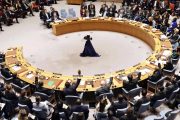
SINGAPORE — The Chinese Communist Party (CCP) has tightened media control by putting more limitations in its criteria for China’s journalist-qualification examination.
On Dec. 30 last year, The Epoch Times reported, the CCP’s National Press and Publication Administration (NPPA) declared a series of new “Measures for the Professional Qualification Examination for Journalists” to be implemented July 1. These new regulations, jointly published by the NPPA and the Ministry of Human Resources and Social Security, have a purported aim to “implement the requirements of Party-controlled propaganda, Party-controlled ideology, and Party-controlled media.”
The examination was crafted to evaluate whether journalists harbor the prerequisite “political qualities.” Put simply, this examination is an indicator of the extent to which journalists would maintain the CCP’s ideology and follow the party’s political directives.
“Applicants must support the leadership of the Communist Party of China, conscientiously study, publicize and implement Xi Jinping’s thoughts on the new era of socialism with Chinese characteristics, resolutely implement the party’s theory, line, principles and policies, and adhere to the correct political direction and public opinion guidance,” the directive read.
The examination will be designed from a list of questions and answers written by the administration, and the Ministry of Human Resources will be tasked with conducting the examinations nationwide and determining who would qualify to sit for them.
For decades, the draconian Chinese regime has been integrating and fortifying its control over journalists and the media. A less stringent examination implemented in 2020 was the predecessor to the new standardized examination. The latter is poised to assess journalists’ ability to provide politically correct answers in a professional setting, based on a Radio Free Asiareport. Those journalists judged to be out of touch with the party line could lose their press credentials, in much the same way China’s lawyers have been suppressed by the CCP.
Since journalists will have to pass the exam to receive a press card, the only legal document permitting them to operate in China, China’s press regulator will maintain files on all journalists’ professional qualifications.
Beijing-based current-affairs commentator Hua Po remarked that as press cards are only valid for five years, journalists will likely have to retake the quinquennial examination. “It’s a way of strengthening control,” Hua said. “I fear that they want to strengthen journalists’ grasp of ideology; they won’t be able to watch from the sidelines anymore.”
“The amount of control they have will be higher than ever, now that it has moved to a unified national examination,” said a former journalist who refused to be identified for fear of reprisal. “Journalists aren’t allowed to speak out … or to tell the truth.”
Based on the NPPA regulations, the press card must be renewed every five years and is verified each year. If the press card does not pass verification, it will be revoked. Violators could have fines imposed on them in addition to criminal prosecution by the authorities.
As the CCP tightens its grip on power, the number of licensed journalists in China continues to drop. In November 2012, there were 248,101 accredited journalists in China. However, by April 2022, the number who had passed the test and successfully received press credentials had fallen to 180,075. That means that there was a decrease of 68,026 journalists — a drop of 27.4 percent — over 10 years.
During the Covid-19 outbreak, the CCP’s harsh restrictions on information flow were especially evident. For example, when Dalian Polytechnic University in northeastern China’s Liaoning Province published 25 obituaries in a single day, the university had to remove the list of deaths after it provoked widespread fears.
Amid the ensuing media storm after the CCP loosened its zero-Covid policy following massive nationwide protests, on Dec. 24 China’s National Health Commission suddenly ceased publishing daily Covid-19 reports, despite having posted them since 2020. The most recent update on the website of the Chinese Center for Disease Control and Prevention (Chinese CDC) as of this writing was on Jan. 8.
A Chinese CDC official stated at the end of December 2022 that the CDC had re-categorized the Covid-19 infection to “Category B,” and thus would only issue outbreak data once a month. The official did not provide further details on when the announcement would be made each month.
“Other countries have no way of knowing the true status of the pandemic in China and whether the virus mutates in a mass human infection, so the other countries can only respond passively,” current-affairs commentator Ji Lin told The Epoch Times. “The CCP’s information control is actually a danger to the entire world.”
China’s “officially approved” journalism began with a 2014 requirement for journalists to study Marxism. In 2016, Xi Jinping indicated during visits to state media organizations that state media are part of the party family, and should protect its authority.
Figures from the state-sanctioned All-China Journalists Association depicted a total of 194,263 accredited state journalists in China as of December 2021. Nonetheless, only 180,075 journalists passed the 2021 political testing and vetting process, with 24 news organizations and 353 journalists having their credentials revoked due to “suspected violations of laws and regulations.”
China is the world’s biggest jailer of journalists, with a total of 110 currently behind bars, the Paris-based press-freedom group Reporters Without Borders claimed in a 2022 annual report.



